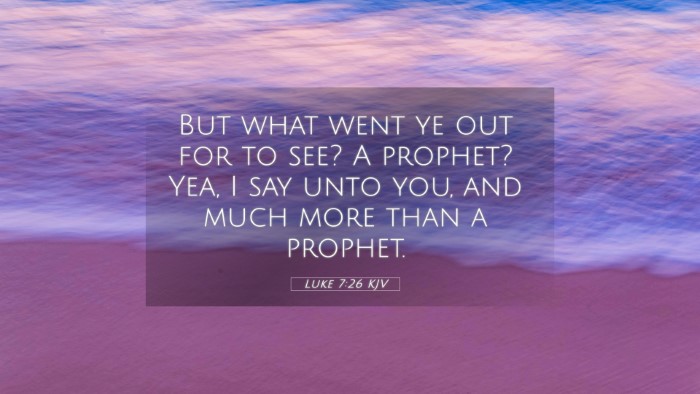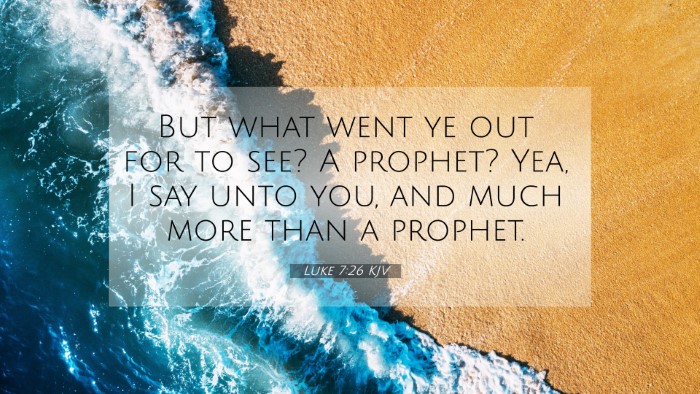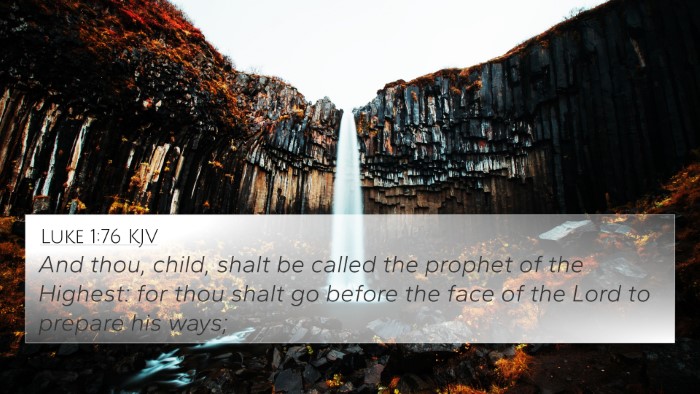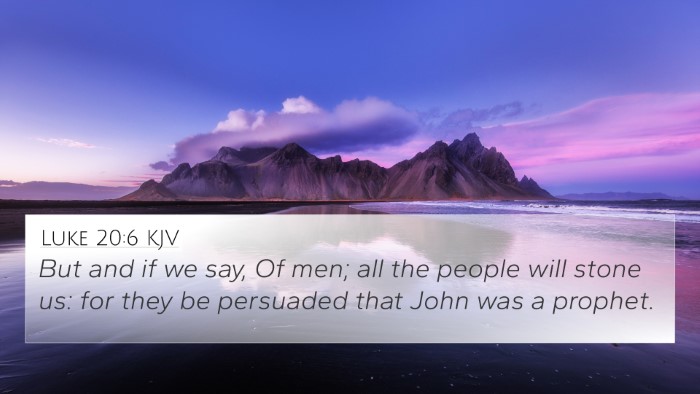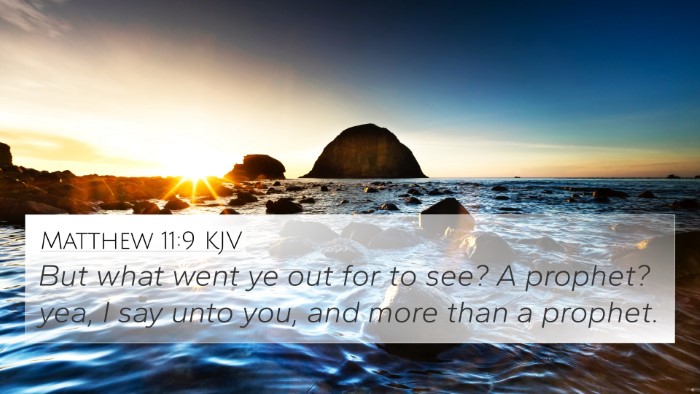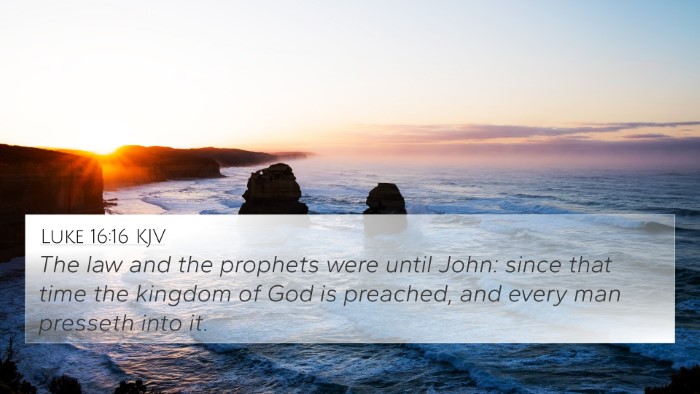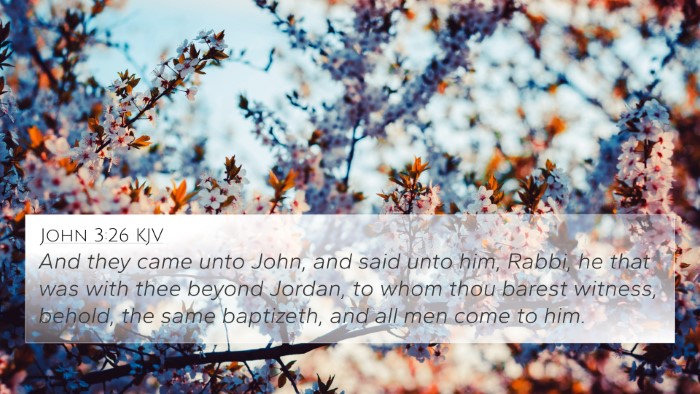Understanding Luke 7:26: A Comprehensive Study
Luke 7:26 states, "But what went ye out for to see? A prophet? yea, I say unto you, and much more than a prophet."
This verse reflects Jesus’ acknowledgment of John the Baptist's significant role and status. To fully grasp the meaning of this verse, we will delve into insights from several public domain commentaries, connecting it with other relevant Bible passages to enrich our understanding.
Context and Meaning
In this passage, Jesus is speaking to a crowd that had come to hear Him, questioning their motives for seeking out John the Baptist. The question posed not only clarifies John’s prophetic ministry but also establishes a comparison with his divine mission and the expectations of those around him.
Commentary Insights
-
Matthew Henry's Commentary:
Matthew Henry highlights that Jesus seeks to clarify the nature of John’s ministry. John was not an ordinary prophet, but one who paved the way for the Messiah. His life and mission were divinely ordained, and Jesus here affirms John's prophetic role, emphasizing his importance in God's redemptive plan.
-
Albert Barnes' Notes:
Albert Barnes explores the idea that Jesus uses this moment to elevate John’s status among the prophets. He notes that while many prophets spoke of God’s will, John’s unique role was to directly announce the arrival of the Kingdom of God, affirming his unparalleled significance.
-
Adam Clarke's Commentary:
Adam Clarke emphasizes the contrast between popular expectations and divine truths, asserting that John excelled not just as a prophet, but as one who represented the highest point of Old Testament prophetic tradition. Clarke posits that this statement also reflects how Jesus reframed the understanding of prophetic fulfillment.
Thematic Connections
Luke 7:26 is interconnected with various themes presented throughout the Bible, creating a rich tapestry of prophetic understanding. Here, we explore several related verses that bolster the context and meaning of this scripture.
Related Bible Verses
-
Malachi 3:1: "Behold, I send my messenger, and he shall prepare the way before me."
This verse directly ties to John’s role as the forerunner of Christ, emphasizing the prophetic expectation of John’s coming.
-
Isaiah 40:3: "The voice of him that crieth in the wilderness, Prepare ye the way of the Lord."
It showcases John's mission as prophesied in the Old Testament.
-
Matthew 11:11: "Verily I say unto you, Among them that are born of women there hath not risen a greater than John the Baptist."
This verse reiterates John's superior prophetic status.
-
John 1:23: "He said, I am the voice of one crying in the wilderness, Make straight the way of the Lord."
This confirms John's acknowledgment of his role and mission.
-
Luke 1:76: "And thou, child, shalt be called the prophet of the Highest: for thou shalt go before the face of the Lord to prepare his ways."
Here, John's prophetic identity is celebrated even before his birth.
-
Acts 10:37-38: "That word, I say, ye know, which was published throughout all Judaea and began from Galilee, after the baptism which John preached;"
This supports the impact of John's ministry leading to Jesus’ teachings.
-
Luke 3:16: "John answered, saying unto them all, I indeed baptize you with water; but one mightier than I cometh."
This illustrates John's humility and recognition of Christ’s divine authority.
Inter-Biblical Dialogue
The verse invites a broader dialogue with various biblical texts, allowing for a comparative analysis that highlights shared themes and prophetic connections across the scriptures. Here, we observe how different sections of the Bible reflect on John's ministry and help us draw connections with Jesus' mission and His fulfillment of the prophecies.
Cross-Referencing Insights
-
Cross-Referencing Bible Study: The insights from Luke 7:26 prompt believers to explore interconnected verses as a tool for Bible study that enhances understanding of God's overarching narrative.
-
Identifying Connections: Engaging with these cross-references enables readers to identify the direct interplay of Old Testament prophecies and their New Testament fulfillments.
-
Comparative Bible Verse Analysis: Such analysis reveals the continuity of God’s message throughout the scriptures, linking prophetic declarations with their manifestations in Christ.
Tools for Bible Cross-Referencing
For further exploration of inter-biblical connections and thematic links among verses, consider utilizing various tools such as:
- Bible Concordance
- Bible Cross-reference Guide
- Cross-reference Bible Study
- Bible Reference Resources
- Bible Chain References
Conclusion
Luke 7:26 serves not only as a reflection on John the Baptist's role but also as an invitation to delve deeper into the Scriptures and find connections that affirm the integrity and continuity of God’s Word. As we understand this verse, we engage in a dialogue between the Old and New Testaments, enriching our faith journey and enabling a more profound understanding of the narrative of salvation.

